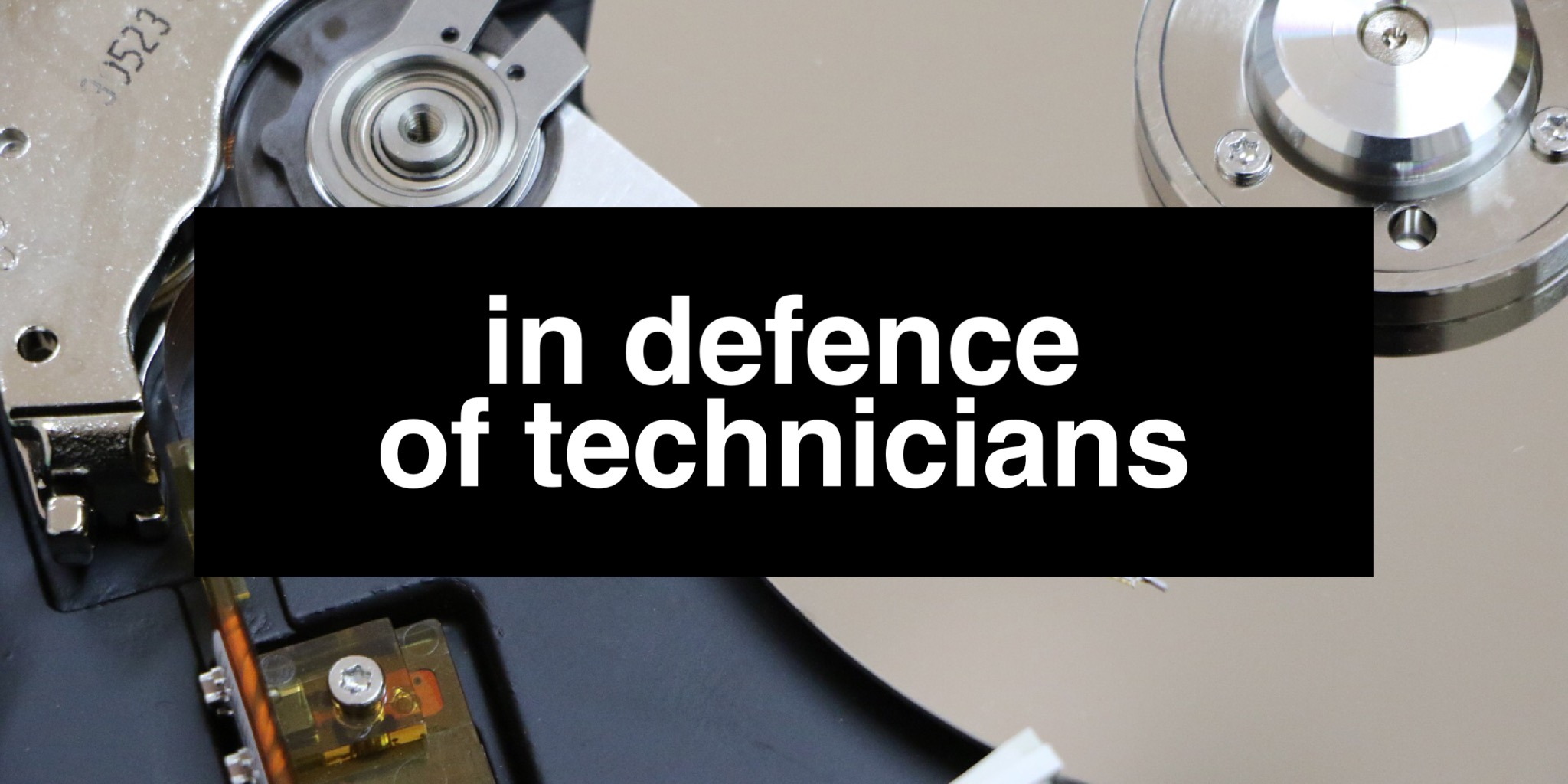
So it seems that my post from last week caused a bit of a furore among technicians; no surprise there I guess given the title although some (wrongly) saw the post as a strategic and personal attack upon those in technical roles in schools. Having read through many pages of forum posts about it and a variety of comments on the post in question I have written the following post to expand upon my original post and take on board a number of different viewpoints on the topic. Additionally for clarity, I want make it clear that I support a lot of what has been talked about which it was felt I didn’t address clearly enough in my previous post. It was felt that my comments at the end of the post saying that the issues raised weren’t commonplace everywhere didn’t go far enough and appeared to be a token gesture. I hope this helps with that.
So what are the arguments?
A number of different arguments have been brought back to me in reply. Patrick (and thank you Patrick) left the following summary and thoughts on his comment on my original post which I think sums it up quite nicely although I will expand afterwards on some other issues:
“Let me now make four simple statements that I believe to be true:
1) There are still too many schools where teachers and learners are hindered by poor ICT systems and staff.
2) There are still too many schools where ICT systems and staff are hindered by poor attitudes towards them.
3) There are many schools where 1 stems more or less directly from 2.
4) There are many schools where it does not.
I hesitate a little with number 4 because my personal belief is that there will almost certainly be a direct correlation – number 4 is essentially just to accommodate the plain bad apples.
The solutions proposed some (including Mark) can work – and have been shown to in practice – but if I’m honest I would have expected to see much more progress in schools across the sector by now. The niggle, I think, is a further complication: there is a “resentment culture”. IT staff MUST take responsibility for their part in that too.
Nevertheless, to my mind, to an extent it’s perfectly natural given the circumstances in play. The problem with the education sector is that all anyone in it wants to talk about is education. That means it is all too easy for any other concerns to be sidelined, among which of course is the “plight” of non-teaching staff in general. Where that affects IT staff is the low pay with limited progression (academisation has not solved this across the board and was never going to), little to no training combined with expectation creep, the glass ceiling and – of course – the unfavourable comparison of their terms and conditions with those of teaching staff (TLRs for additional responsibility etc).
What I say now, I say directly to Mark and every other current or former senior leader with valid concerns about IT staff in education:
Where employment structures create an artificial delineation between groups of staff – particularly where it’s just the two – a “resentment culture” will arise. It simply will, and it is behind both many of these problems and the reason why many of us immediately go on the defensive when presented with blogs such as this. We would move things forward in this sector a lot faster (or indeed at all!) if its leaders, bloggers and politicians would only focus on addressing that root cause instead of pointing the finger when staff display its symptoms. There is a HUGE lobbying gap there that Education Leadership unions – as well as other “free voices” – are simply not addressing.””
Pay and opportunities for CPD
In general terms it was felt that technicians aren’t given enough money for their jobs or given decent supportive professional development opportunities to sustain their skills. The second point here about professional development is absolutely key. In order for technicians to stay current and to keep your networks as secure as possible, professional development opportunities are absolutely required. From a leadership perspective, this should be built in to the annual CPD budget in order to facilitate management of these finances. Courses for technical services are often not cheap and so forward thinking and planning is paramount if they are to happen.
Glass ceiling
A number of people commented on the lack of pay progression opportunities in their comments and that there is a glass ceiling in the work that they do. A number of them commented how there was no opportunity for them to progress any further than perhaps network manager. A few quoted some good examples of how facilitating the access of the right candidate to a leadership position in the school can have great benefit to the school. In my experience, this doesn’t happen very often, however I can see their point. Someone who has a clear understanding of how data and access to information across school systems should have an integral and important role to play in the management of a school. Perhaps we (as an education community) should consider this in our management structures; after all – data does play (whether we like it or not) a massive part in our quality assurance processes and in our day to day running of our schools.
Communication
One area which came out in discussion more often than most was the area of communication between technical support teams and the rest of the teaching community; from teachers to leadership.
In his post ‘Stop, Collaborate and Listen‘, Matt ‘Ice Ice Baby’ Setchell (apologies Matt, I couldn’t help it) writes about there being a need for all stakeholders to come together on issues concernining technology and learning. He writes:
“We both have hard, demanding, complex, ever changing roles with constant pressure and changing goal posts. It’s not a competition to see who fails first or who we can frustrate the most. It should be how can we be inclusive and work together for a solution that propels our core business, learning for young people forward.”
It is absolutely right, that stakeholders should talk together and work together to this core aim that he talks about. From the feedback I’ve received from numerous network managers and technicians on this topic there is a huge amount of bad feeling amongst them that they are not involved in important discussions – this should stop. A number of different responses have also stated that no technician has ever been the reason why a school has been given a failing Ofsted too – well of course that is the case, that is something which comes down to the leadership and management of the school; however – it does highlight the misinterpretation of the situation.
The point of all of this has been that despite there being some fantastic colleagues out there who work such as Matt and others that have added their points of view such as Tony Sheppard there are still (as highlighted in this post from Andrew Douch) a significant number of schools both nationally and given Andrew is in Australia, internationally where technical staff don’t communicate well with teaching teams to bring about suitable access and progress which can have an impact upon learning. Andrew writes:
“I’m not saying some sites shouldn’t be blocked at school and I absolutely appreciate the instrumental role that a technician plays in a school (great technicians are worth their weight in gold! — this I know from my own school experience). Neither am I saying that technicians shouldn’t offer advice and guidance about technology choices. They obviously have invaluable experience, insights and knowledge. But a technician’s primary focus is necessarily on technology, whereas a teacher’s is on pedagogy. We need to remember the primary purpose of schools and keep those two foci prioritised accordingly.
If an application or service poses a real threat to the security of the network (Bit Torrent, P2P), then I think it’s the technician’s place to make that call. But in many schools, something is disallowed because the technician thinks students will waste time on it (YouTube, Twitter) or they just don’t like it (Macs, Weebly), or it side-steps a system they have spent time setting up for the school (DropBox, Schoology). In such cases it’s not an issue of network integrity but classroom management — making it an educational decision that should be decided by teachers.
Great technicians are enablers – reducing the friction of implementing new teaching ideas. Alas, in some schools the technicians are the source of the friction. Teachers (and principals) shouldn’t put up with that.”
Jon Witts
In Jon Witts’ post also titled ‘In defence of technicians‘ he writes that he disagrees with my point about in some schools teachers play the role of technicians. I absolutely agree with what he says. That said, I have come across a number of Primary schools where for whatever reason although often budgetary teachers end up taking on the role of technician in the day to day running of the network and managing hardware on site. This isn’t an ideal situation by anyone’s standards but his points are in alignment with my thinking too however in some schools budgetary restraints mean that this does happen.
“I cannot honestly agree that in this day and age a teacher can be expected to, nor have the time to, run a school network to level which modern technology requires. Now we are not just talking about ensuring the teachers can use the tech in their classrooms here; a modern school network now needs to support a myriad of different uses”
Jon also argued the point about managed services not being helpful with a school. Again, this could have been made clearer in my post, however I have experienced both negative and positive experiences with managed services. The positive examples I have experienced are those where there have been an onsite support alongside external support that can come in when necessary, again in Primary. Primary schools have such tight budgets compared to Secondary schools – it’s likely to be the case that the majority of Primary schools cannot afford a 30K+ salary to manage and run their technical services. It may be money well spent but I suspect that other priorities often take over.
Jon continues to make some valid recommendations where he says that he thinks that:
- “The IT Support team needs to managed by someone with technical experience and knowledge of the systems required to run a network – agreed
- This person should sit very close in the hierarchy to SLT and be the “go to person” for SLT about any technical query – agreed
- It is the duty of this person to ensure they stay abreast of both the changes in EdTech in T&L as well as more general technological issues – agreed and time and CPD should be prioritised for this
- This role needs to be given the support and authority by SLT to form working parties with all areas of the school, admin team, HoDs etc. to ensure that there is a clear route for all areas of the school to get their desired approaches and use of IT into the whole school development plan – disagree, this should be managed and brokered by a member of the leadership team who has oversight of the whole package – that doesn’t necessarily mean they aren’t included but it would be down to the member of the leadership team to ensure inclusion.
- This person does not necessarily need to have teaching experience, but at the very least they should be comfortable with providing training programmes to their peers. That said I think it would be wise of schools to allow the person in this role the chance to teach too – It always helps to see things from both sides of the fence! – I think this could be a desirable although not necessary.
- The school has a duty to ensure that the person in this role has the opportunity to access quality CPD to ensure they stay up to date with what technology can do in the classroom – agreed
- The Governing body and SLT have a duty to ensure that the required capital funding to support the developments to educational technological provision are meet and regularly tabled and discussed – agreed“
To wrap up…
This is clearly a long post but goes in many ways to what is clearly an issue in schools. Perhaps I should just leave it here for now and I’ll end by doing two things. Firstly reiterating Patrick’s end point from his comment (edited)…
“We would move things forward in this sector a lot faster if its leaders, bloggers and politicians would only focus on addressing that root cause instead of pointing the finger when staff display its symptoms. There is a HUGE lobbying gap there that Education Leadership unions – as well as other “free voices” – are simply not addressing.”
And secondly by saying that it is good to know that there are positive conversations happening to start addressing these issues.
Let’s continue the conversation.















The additional element that I forgot to include but that I feel is important to say is that technical staff should not be asked to do a resources person’s job – i.e. fill toner, replace paper, order paper, etc. #justsaying
Statements such as ‘Great technicians are enablers – reducing the friction of implementing new teaching ideas. Alas, in some schools the technicians are the source of the friction. Teachers (and principals) shouldn’t put up with that.”’ really annoy me.
First of all, this is right but only to a certain point, because techs/network managers should never ‘enable’ every single request without thought merely in order to be considered a ‘great’ technician/NM. Part of our job is to keep the network and its users secure, and to ensure the stability of that network. Giving carte-blanche for all staff to install anything they like, for instance (as mentioned in the Douch blog) a is not being an ‘enabler’ it’s being unprofessional.
As for not putting up with techs being the source of the friction, this is in the eye of the beholder – yes, if I told him that it was irresponsible of him to download any old piece of junk software he wanted to, I’d be that source of friction in his mind…and I’d want the wholehearted support of the school for being so.
Thanks for your comment Tony.
Perhaps it would be well placed (or cross-posted) on Andrew’s blog post too where the quote originated? I believe I linked to it in the main body?
Cheers
Mark
Comments are closed on that thread.
Doh!
Many thanks, Mark, for including my views and so many others in your new post – it is truly appreciated! 🙂
Cross-posting from EduGeek once again…
Essentially I agree 100% with your view that the IT leadership role/responsibility “should be managed and brokered by a member of the leadership team who has oversight of the whole package”. However, I also believe it should be perfectly possible for this to be the same person as defined in Jon Witts’ points 1 and 3. This in turn implies that, because strategic ICT IS a leadership issue, opportunities should be available for the most senior member of the IT staff – if they possess all the right qualities – to JOIN the leadership team in that capacity.
Failure to allow for this is what CREATES the glass ceiling. Right there. Plain and simple. That “allow for” is careful wording, too – it may not be possible or required in some places, but the fact that such a notion is more likely than not to be rejected out of hand is where we get the glass ceiling from in the first place.
I realise you’ve already responded with much the same view as this on EduGeek but wanted to air it here as well, and to link it to the “glass ceiling” header in your post.
Yep – I agree again, with the caveats you’ve included which is essentially what I said on Edugeeks too. Thanks again for taking the time to contribute.
BW,
Mark
Patrick and Mark,
Thank you both for taking the time to discuss this important matter further. I have long thought that this strategic IT lead in schools should be sitting on the leadership team of a school; you would not see any business the same size as a secondary school not have IT represented in their leadership structure – why should our schools be any different?
With this in mind Mark, it some covers the point of the forming of working parties and feeding into the school’s development plan; as this role would have that oversight required to carry out these tasks if they sat on the leadership tier.
I appreciate that the situation in secondary and primary schools is very different, and I can see that managed services at this point could be beneficial; but is this not just privatisation of the service the LAs were previously offering? 😉
Jon
Our NM was the opposite of an enabler and teachers were reluctant to ask for anything, for years and years, till the nm took redundancy and now there is no NM. His responsibilities are divided between the bursar, technicians and an ICT Strategy Group and everybody is a lot happier and things get done easier. There’s almost no responsibility on technicians to decide whether teachers ought to get things or not. Teachers request funding through their line managers who deal with the bursar and then the technicians make up the purchase order using their expertise to find the most appropriate specs/purchases. Anything else is dealt with between technicians and bursar and 3rd party companies.
This kind of setup works well but I think also it requires a lot of trust with the technicians and for them to be good enablers.
My only concern with that kind of setup would be whether or not you had a high enough level of technical insight and knowledge to feed into the ICT Strategy group… I would not expect a technician to keep up with all of the technical nuances of the latest and greatest piece of EdTech; but that kind of insight is really invaluable when strategically planning where you want your school’s IT to move to over the next 3 years…
That said; it doesn’t sound like you were getting that from your previous NM, so I guess you aren’t losing anything!